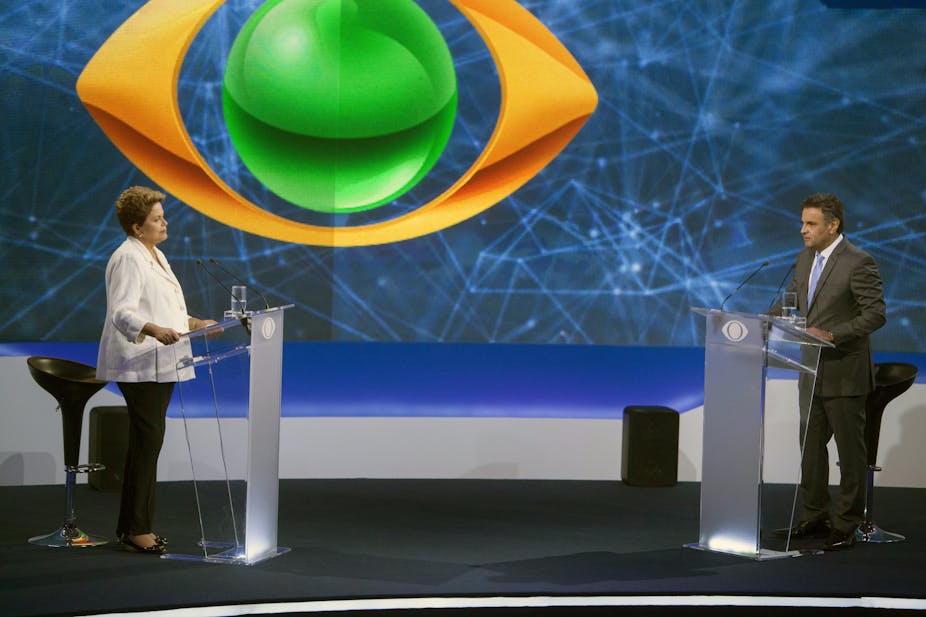The Brazilian presidential election of 2014 has so far thrown up more surprises and plot twists than a telenovela. In the first round ballot on October 5 the left of centre incumbent, Dilma Rousseff of the Worker’s Party (PT), achieved 42% of the vote, with Aécio Neves of the centre-right Party of Brazilian Social Democracy (PSDB) coming in second with 34%. Third in the running was Marina Silva, the centrist candidate of the Brazilian Socialist Party, with 21%.
With nobody achieving 50% of the vote, there will be a run-off election between Dilma Rouseff and Aécio Neves on October 26. The two candidates are locked in a dead heat, in what has been a roller-coaster campaign for the presidency of Latin America’s largest economy.
Two very different candidates
The rise of Neves as a serious candidate has been a surprise. Very much from the old Brazilian political establishment, Neves benefited from a late surge to take second place and put himself in the run-off second round vote with Rousseff. And now he is benefiting from much of third-placed Silva’s support, following her endorsement and that of her party.
The fact that the election is too close to call is more due to Rousseff’s unpopularity, rather than Neves offering anything with which the Brazilian people could fall in love. His policies hark back to the neo-liberalism of his mentor and former president, Fernando Henrique Cardoso in the 1990s. These are a tight grip on inflation, fiscal conservatism, cuts to welfare and fresh waves of privatisation.
In addition to these supposedly sound macroeconomic policies, Neves also promises to cut government bureaucracy, make Congress more accountable and reform Brazil’s tax system. While not populist, this suite of policies is very attractive to Brazil’s middle class who have been newly invigorated after 15 years of relative stability and economic growth.
He also has the support of big business. Large multinationals back him in the hope that the new government will open up its newly discovered oil reserves and break the monopoly of Petrobras, Brazil’s state-owned oil company.
Popular appeal
But Neves’ economic policies are not attractive to the poor of Brazil, who make up the majority of the population. Many Brazilian families rely on state handouts – especially Bolsa Familia – to immunise their children from disease and put them through school as well as feed their families and heat their homes. So cutting welfare is not attractive for them. Neves and the PSDB’s desire to implement this kind of economic model has led to them being easily caricatured as a bunch of greedy politicians and businessmen who care nothing for the poor and their worries.
Instead, these elements of Brazilian society are much more attracted to the economic principles of Rousseff and the PT. State directed development through Federal subsides of key industries, protection of key sectors like petroleum, and large welfare programmes like Bolsa Familia (as well as other successful programmes concerning areas like affordable housing) are much more appealing than austerity and cuts.
And yet, Neves’ popularity has surged. This is the result of both a series of scandals and the relatively poor performance of the Brazilian economy in recent years.
From the Mensalão scandal in 2005 – a case of vote-buying corruption – through to recent allegations of illegal bribes and payments in Petrobras, the PT has been embroiled in a series of scandals that has hit their popularity hard.
This has been made worse by a recent dip in Brazil’s economy. Whether this is largely due to the twin factors of the fall-out of the global financial crisis and the end of the commodity boom of the start of the 21st century, or economic mismanagement on the part of the PT, is a detail largely lost on the Brazilian electorate. They see the PT as the party that has been in power now for more than a decade and is therefore responsible.
Despite these not inconsiderable headwinds, Rousseff and the PT are likely to be successful in the October 26 runoff. Dilma is inching ahead in the latest polls and the second-placed candidate from the first round has never won in a Brazilian election.
Plus, her party’s considerable electoral machine spent its time and money discrediting Marina Silva during the first round and can now focus its energies on Neves and the PSDB in the second. Also, despite recent setbacks, the PT still offers a message of hope and support to a vast population which needs it – as opposed to the PSDB’s message of austerity, cuts, and trickle-down economics.

